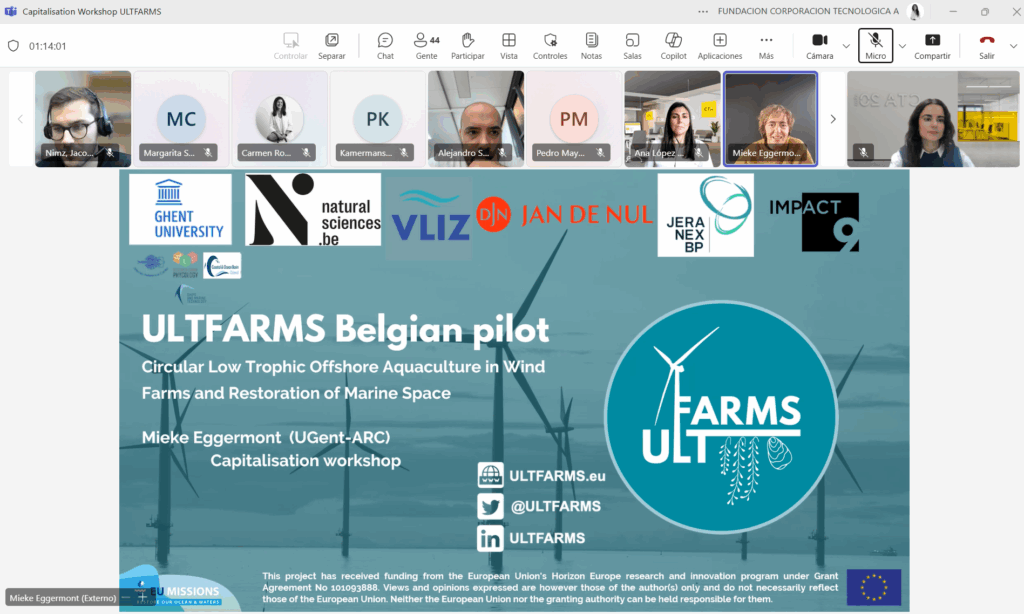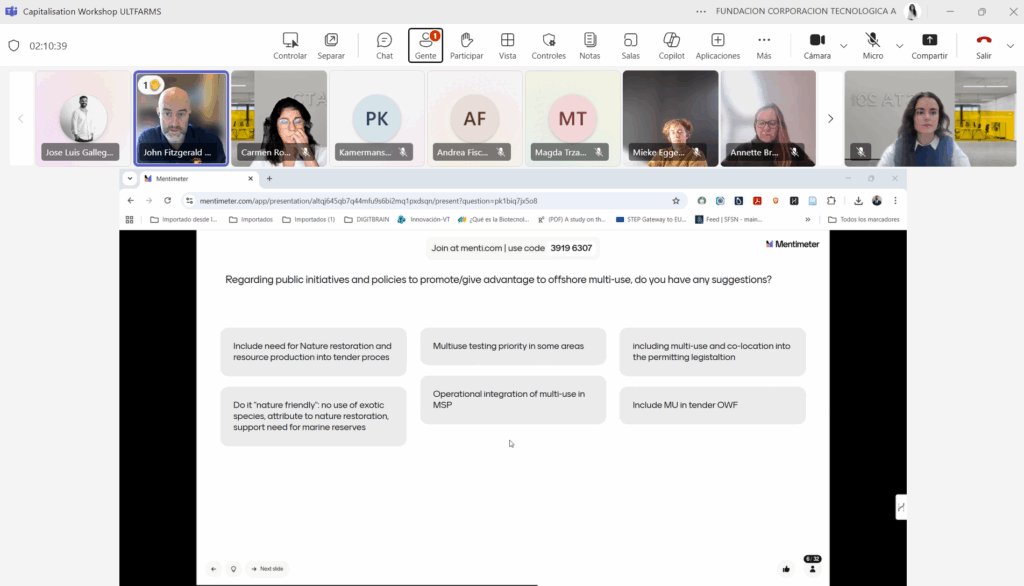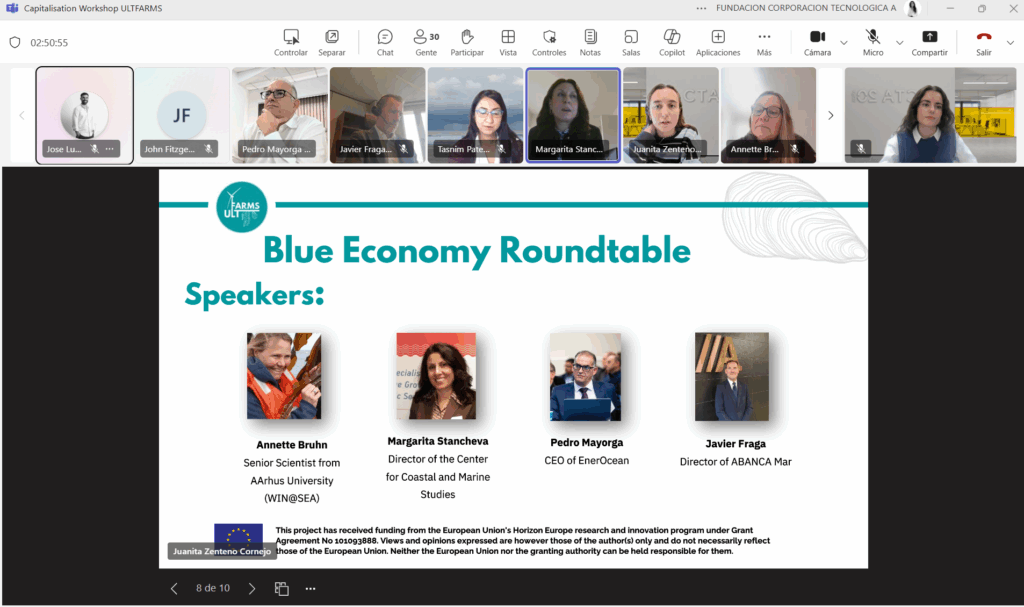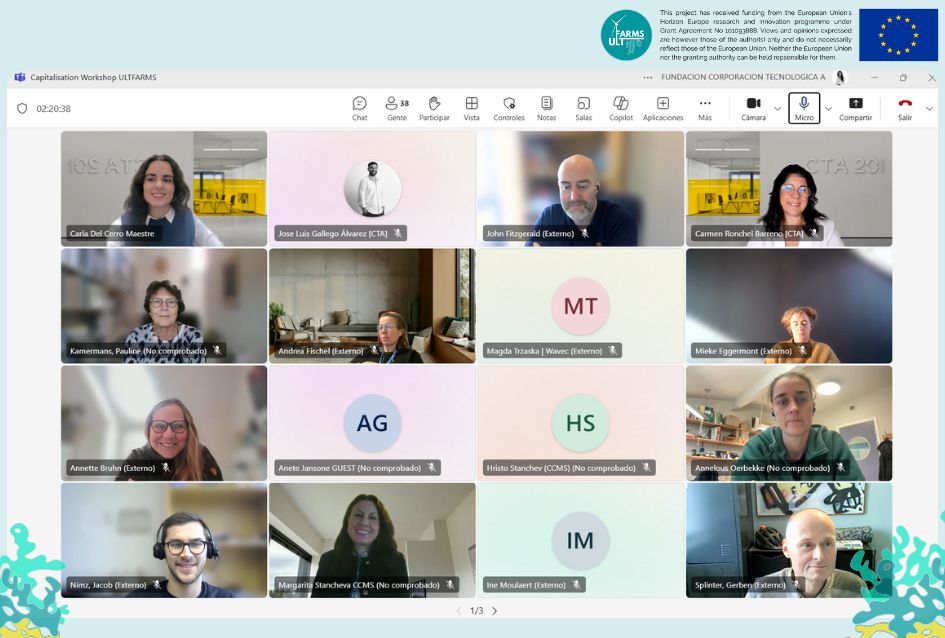On 5 November, the ULTFARMS European project (Ultra-Large Multi-Functional Offshore Farms), funded by the Horizon Europe programme, held its second Capitalisation Workshop, an online event aimed at advancing the commercialisation strategy of the project’s Key Exploitable Results (KERs). Organised under Work Package 5 (WP5) and hosted by Technological Corporation of Andalusia (CTA), the workshop gathered representatives from ULTFARMS’ offshore pilots alongside experts from the blue economy, research, policy and investment fields.
A project shaping the future of offshore low-trophic aquaculture
The event opened with an overview of ULTFARMS, an Innovation Action designed to enhance Europe’s capacity for low-trophic aquaculture (LTA) primarily seaweed and molluscs while fostering a more sustainable and competitive blue economy. The project promotes multi-use of marine space, integrating novel engineering solutions with ecological and biological research to optimise species production in challenging environments such as low-salinity areas or rough offshore conditions.
ULTFARMS operates six Low-Trophic Aquaculture Pilots (LTAPs) located within offshore wind farms across Belgium, the Netherlands, Germany and Denmark. Over 42 months, the project engages actors across the entire aquaculture value chain to develop environmentally responsible and commercially viable production systems, while contributing to Europe’s renewable energy targets.
CTA’s contribution focuses on shaping exploitation pathways and building business models for the project’s exploitable results, in close collaboration with pilot operators and technical partners. These models, many presented during the workshop, form the basis for the exploitation plans currently under development.
Showcasing pilots and exploitable results
A central part of the workshop was dedicated to presenting the technical progress and commercial potential of the project’s pilots. More than 15 exploitable results were showcased, highlighting significant advancements in multi-use farm design, cultivation systems and environmental monitoring tools.
Despite this progress, speakers also outlined common challenges facing offshore aquaculture, including limited funding opportunities and rising development costs, the complexity of regulatory and permitting frameworks, legal and logistical barriers linked to multi-use sites, coordination difficulties between aquaculture, energy and local authorities, and harsh weather and operational constraints in exposed offshore locations.

Capitalisation session: external perspectives for stronger business models
The workshop’s capitalisation session, including an interactive Mentimeter activity, gathered input from external stakeholders to complement the business models developed for ULTFARMS’ KERs. Participants emphasised key issues such as competition for marine space, regulatory fragmentation, the need to clarify future market demand, and the importance of improving social awareness and acceptance of low-trophic aquaculture.
This external feedback will directly contribute to strengthening the project’s commercialisation planning and ensuring that the solutions developed are aligned with real industry needs and market conditions.

Blue Economy Roundtable: financing, regulation and market uptake
The concluding roundtable brought together experts from academia, industry and finance to debate the main barriers to commercialisation and the mechanisms needed to scale sustainable offshore farming solutions.
Key contributions included:
- Techno-ecological challenges and the need for aligned, safety-focused regulatory frameworks.
- Critical permitting and licensing issues, the importance of involving local communities, and the value of ecosystem services such as habitat enhancement.
- Financing insights, including the need for clear regulation, incentives for early innovators and designated multi-use areas to attract investment.
- The importance of robust business and marketing plans to demonstrate economic viability and facilitate collaboration among different sectors.
Panelists agreed that stronger regulatory coherence, improved communication of project value and diversification of revenue streams will be essential to scale offshore multi-use aquaculture in Europe.

They participated:
- Annette Bruhn, Senior Researcher at Aarhus University (WIN@SEA)
- Margarita Stancheva, Director of the Center for Coastal and Marine Studies
- Pedro Mayorga, CEO of EnerOcean
- Javier Fraga, Director of ABANCA Mar
A key milestone for ULTFARMS

This second Capitalisation Workshop marks a significant milestone in the ULTFARMS project. By integrating technical progress from the pilots with expert external perspectives, the event strengthens the project’s pathway toward commercialisation and supports the transfer of innovative solutions across Europe.
Expected outcomes include greater visibility and readiness of the Key Exploitable Results, contributions to future EU initiatives and marine sustainability policies, identification of best practices and new opportunities for knowledge exchange, and the creation of synergies across projects, regions and sectors.
The insights gathered will guide the finalisation of ULTFARMS’ exploitation plans, accelerating the project’s contribution to a sustainable, nature-positive and innovative offshore aquaculture sector in Europe.
More info: https://ultfarms.eu/
Follow them on their social media:

